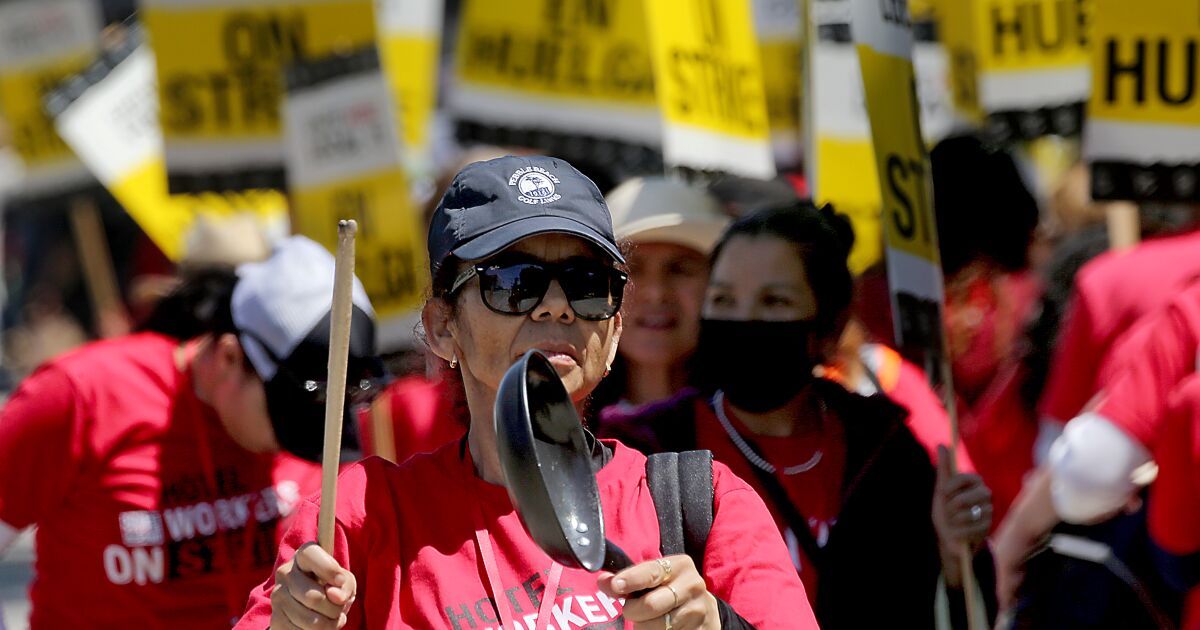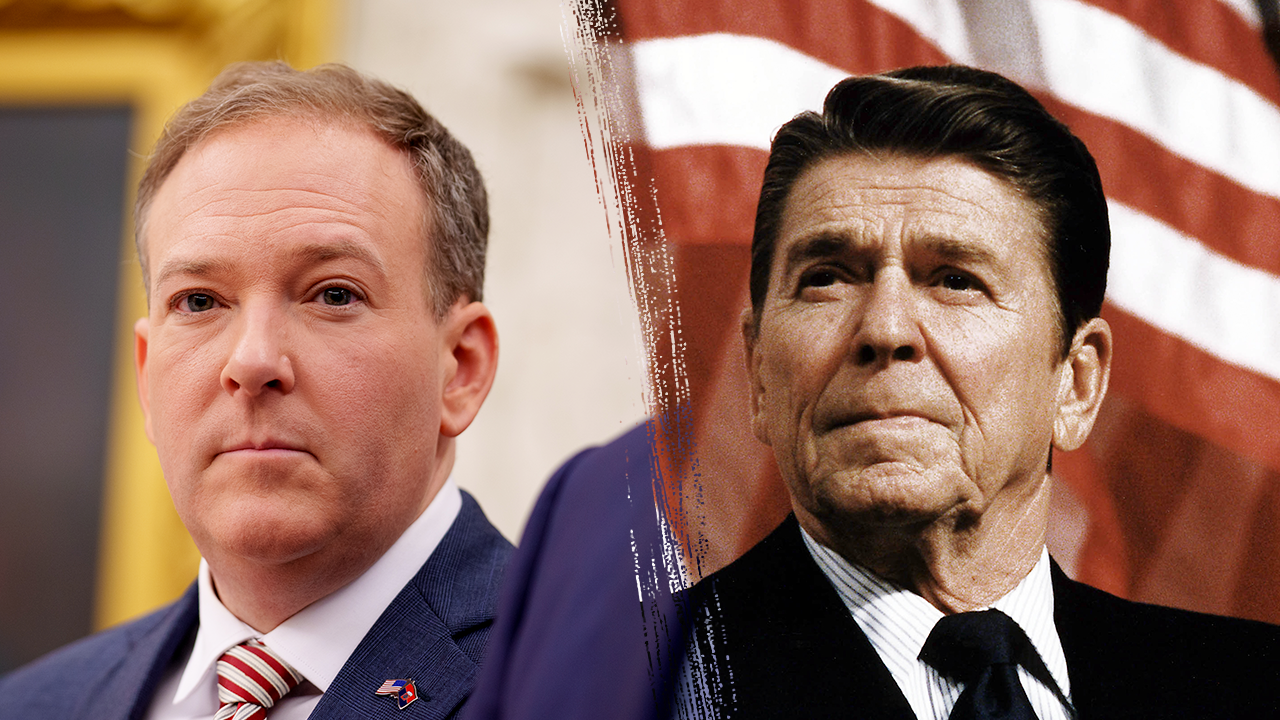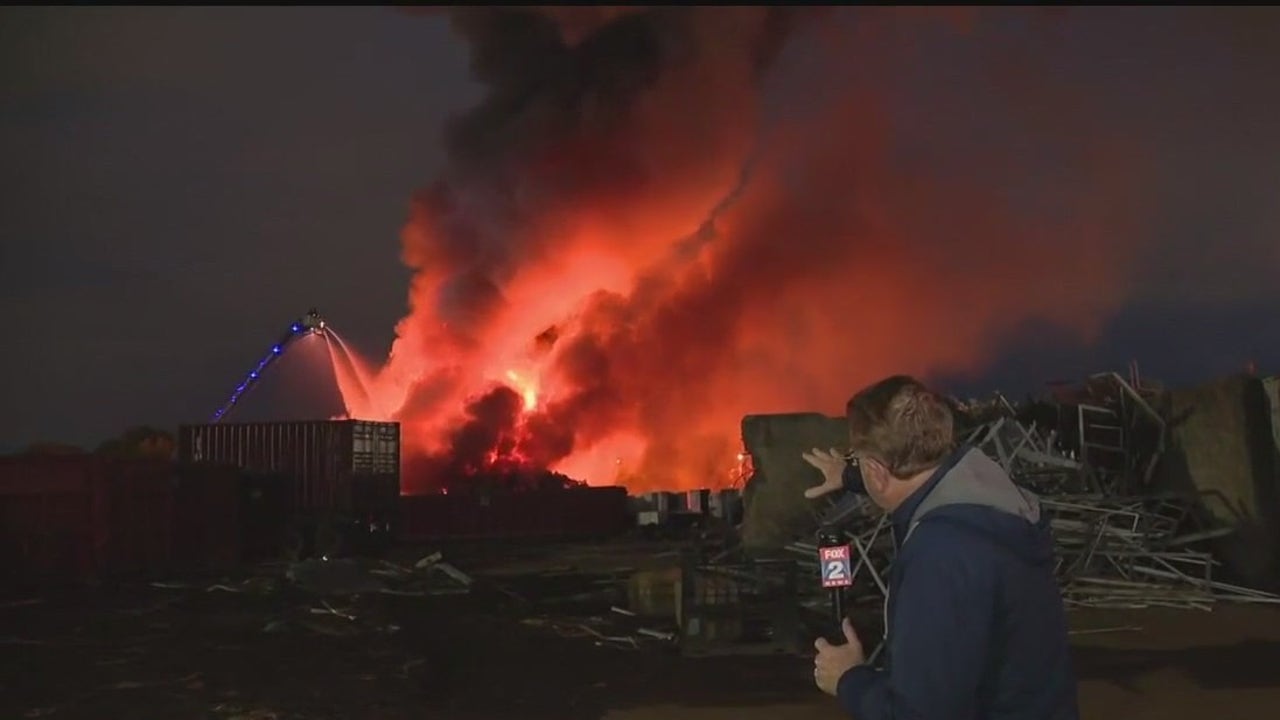Business
Worker strikes hit more hotels, this time near Disneyland

Hundreds of workers at four hotels, including two near Disneyland, walked off the job Tuesday, joining a second wave of strikes that kicked off this week.
Starting at 5 a.m., workers from the Hilton Anaheim, the Sheraton Park Hotel at the Anaheim Resort, the Irvine Hilton in Orange County and the Hyatt Regency near Los Angeles International Airport walked out, demanding higher pay and better benefits. The action comes a day after thousands of workers at eight hotels near LAX also walked off the job.
After contracts expired June 30, Unite Here Local 11-represented workers at more than 60 hotels authorized what could be the largest U.S. strike for the industry in recent memory. Not all hotel workers have walked out, per a strategic rollout decision made by union leadership. The walkouts this week come after a three-day strike hit hotels in downtown Los Angeles, Santa Monica and Orange County over the busy Fourth of July weekend.
The union represents 32,000 workers in the industry in Southern California and Arizona and has been negotiating a new contract since April. The union has proposed an immediate $5 hourly wage increase and $3-an-hour boost for each of the remaining two years of their three-year contract.
Keith Grossman, an attorney with Hirschfeld Kraemer, one of two firms representing a coalition of 44 Southern California hotels, has said the group has offered meaningful wage increases, proposing raises of $2.50 an hour in the first 12 months and $6.25 over four years. Grossman said the union has yet to respond to this proposal.
“Hotel workers across Santa Monica, DTLA, LAX, to Beverly Hills, Anaheim, and Irvine are more united than ever to fight for a contract that allows them to live in the city where they work,” said Kurt Petersen, co-president of Unite Here Local 11, in a written statement.
Cecilia Hernandez lives in Anaheim with her three children and husband and has worked in housekeeping at the Sheraton Park hotel for 23 years. About a year and a half ago, she was diagnosed with throat cancer.
“It’s difficult because it’s something that changes your whole way of life. There are days you can’t get up. You can’t eat. It affects your immune system and your entire family environment,” said Hernandez, who wants to ensure that her health insurance costs stay low for her radiation treatments.
Javier Espinoza-Arjón, who works nearby at the Hilton Anaheim as a hotline cook, has similar concerns. He starts his commute at 3:20 a.m. from Corona to Anaheim for his 4:30 a.m.-1 p.m. shift. After working at the hotel for 39 years, his hands have weathered. He is hoping for higher wages and a better pension plan.
“We want higher pension plans because with the amount of funding that the government gives, we have to work our entire lives to retire,” Espinoza-Arjón said.
The Westin Bonaventure Hotel & Suites in downtown L.A., the union’s biggest employer, with more than 600 workers, reached a tentative deal June 28 and is the only hotel that has averted a strike. The union has urged other employers to adopt that agreement.
Grossman said that the Coordinated Bargaining Group offered the union two dates —Friday and July 18 — to resume bargaining and has received no response.
“UNITE HERE Local 11’s intransigence and unwillingness to meet is hurting our employees and continues to damage Los Angeles’s reputation with tourists,” said Grossman in a written statement. “It’s clear that from Day One, Local 11 only wanted to strike and was not focused on the interests of our employees or the City.”
According to union spokeswoman Maria Hernandez, no new bargaining sessions have been scheduled. “We’re consulting with the organizing committee to see what they want to do, but ultimately what the workers want is for them to sign the Bonaventure deal.”
Anaheim’s hotels play a significant role in housing guests who come to the city for conferences, sports entertainment, and Disneyland tourism. A few weeks ago, the Anaheim Convention Center welcomed thousands of attendees and hundreds of brand exhibitors to VidCon, YouTube’s annual digital culture and creator conference. The growth in popularity of the Angels’ baseball player Shohei Ohtani has also spiked international interest and travel from Japan to Southern California. The overall visitor economy makes up 50% to 60% of Anaheim’s annual tax revenue through occupancy, sales and property taxes.
While three other hotels in the Disneyland area — Disney Grand Californian Hotel, Disneyland Hotel, and Disneyland Paradise Pier Hotel — are also members of the Unite Here Local 11 union, they have a separate contract that does not expire until Jan. 31, 2026.

Business
The Stock Market’s Boomerang Month Has Put Investors in a Bind

The stock market is now higher than before President Trump’s broad and steep tariffs sent share prices into a tailspin. The 10-year government bond yield is now largely in line with where it started the year. On Tuesday, a widely watched measure of inflation nudged lower.
Judging from a snapshot of today’s financial markets, it would be easy to conclude that very little had happened over the last four and a half months.
As the administration has dialed down its trade offensive, delaying the worst of the tariffs announced on April 2 and promoting a long list of trade deals in the works, stocks have risen and the unnerving volatility in the government bond market — which Mr. Trump noted when he first began pausing his tariffs — has subsided.
On Tuesday, the latest reading of the Consumer Price Index showed a slower pace of inflation in April than economists had predicted, despite widespread concerns that tariffs could have sped up price increases.
The S&P 500, which came close to hitting a bear market early last month, is now up slightly since the start of the year, after a 0.7 percent gain on Tuesday.
Still, investors remained cautious, and complain that the outlook remains uncertain, with little clarity on what the final level of tariffs will be.
That leaves them in a tricky position, with many saying they have little conviction as to where the economy is headed but they cannot afford to wait on the sidelines and miss out on the possibility that tariffs will be lowered further and stocks will rise.
In the meantime, investors are still trying to parse how the tariffs that remain in place — including 30 percent tariffs on many Chinese imports — are affecting consumer spending and corporate profits
John Kerschner, a portfolio manager at Janus Henderson, said signs of tariff-fueled inflation are not likely to show up in the economic data for months.
“The market will wait with bated breath for those readings to make a determination of where we actually stand on tariff induced rising prices. Thus, market uncertainty will likely remain elevated,” Mr. Kerschner said.
The Federal Reserve is also in a wait-and-see mode, unwilling to keep lowering interest rates before the inflationary effect of the new tariffs is known. That’s because lower interest rates stimulate the economy and could add a further tailwind to inflation.
Market bets on when the Fed will next lower interest rates have gradually been pushed further out. At the start of this year, investors were anticipating that the Fed would lower interest rates at its meeting last week. Now, investors expect the first rate cut of the year to arrive at the September meeting.
Ellen Zentner, chief economic strategist for Morgan Stanley Wealth Management said the lower than expected reading in the Consumer Price Index on Tuesday “doesn’t mean tariffs aren’t impacting the economy, it just means they aren’t showing up in the data yet.”
“Wait-and-see is still the name of the game, and until that changes, the Fed will remain on the sidelines,” she added.
The longer uncertainty prevails, the more it becomes its own economic force, separate from the tariffs. Uncertainty means businesses hold off on making investment decisions and consumers pull back from spending, slowing economic growth.
Beneath the surface, that concern is still evident in the markets.
The Russell 2000 index of smaller companies, which are more at risk from a downturn in the economy, has risen from its lows, but remains 14 percent lower than its peak in November. The S&P 500 is only 4 percent below its February high.
The lowest-rated corporate debt continues to show some signs of strain.
Then there is the dollar, which has sent the most pointed signal of concern about tariffs. The dollar index, which measures the currency against a basket of its peers, has fallen 6.9 percent so far this year.
That is the dollar’s biggest slide since the end of 2022, when the Fed pivoted from raising interest rates, which had strengthened the dollar, to holding them steady.
But even now, as tariffs have de-escalated, the dollar has regained ground.
“As far as markets are concerned, there’s now a belief that the worst of the trade war has passed, and that the trend is now towards de-escalation,” noted analysts at Deutsche Bank said in a recent research note. But they also warned, “The U.S. is not out of the woods yet.”
Business
Google settles lawsuit alleging bias against Black employees

Google agreed to pay $50 million to settle a lawsuit alleging the search engine giant was racially biased against Black employees.
The settlement, which was reached after mediation and certified by a U.S. District Court judge in Oakland on Friday, covers some 4,000 Google employees in California and New York.
The original lawsuit came after a state agency, now known as the California Civil Rights Department, in 2021 began investigating Google’s treatment of Black female workers.
In 2022, former Google worker April Curley filed a lawsuit in federal court in San Jose alleging that she and other Black workers experienced systemic discrimination.
Curley, who worked at Google for six years, had been hired to conduct outreach and design recruiting programs with historically Black colleges.
However, her experience at the company quickly soured, she said, alleging that she was stereotyped as an “angry” Black woman, that she and other Black women had not been allowed to present during important meetings and that she was wrongfully terminated in 2020 after challenging internal practices.
Black workers were hired to lower-level jobs, paid lower wages, subjected to hostile comments and denied promotions, Curley and other Black workers who joined the proposed class-action alleged in their lawsuit.
The complaint said managers disparaged Black employees for not being “Googley” enough, comments the plaintiffs said served as racist dog whistles.
Throughout the litigation, the Mountain View-based company has maintained that it did not violate any laws.
“We’ve reached an agreement that involves no admission of wrongdoing. We strongly disagree with the allegations that we treated anyone improperly and we remain committed to paying, hiring, and leveling all employees consistently,” Google spokesperson Courtenay Mencini said in a statement Tuesday.
In addition to the monetary payout, Google has agreed in the settlement to analyze pay and correct differences based on race for the next three years. The company has also committed to maintaining transparent salary ranges and methods for employees to report concerns about pay or other practices.
And through August 2026, the company will not require employees to enter into mandatory arbitration for employment-related disputes, according to the settlement agreement filed last week in federal court.
Business
Tariff Misery in Japan: Honda and Nissan Forecast Plunges in Profit

President Trump’s decision to negotiate a break for China on tariffs is galling for Japan, which is reeling from auto sector levies that the White House has shown no sign of willingness to lift.
Japan, a top U.S. ally in Asia, was eager to advance trade negotiations with Washington, even as Mr. Trump imposed tariffs on automobiles, and threatened an across-the-board 24 percent tariff on Japanese goods.
While Beijing and others assembled plans for retaliatory tariffs, Japan rushed to Washington for trade negotiations, armed instead with commitments to buy more American goods and boost investments in the United States to $1 trillion.
Now in Tokyo, the sting is palpable.
On Tuesday — one day after the Trump administration agreed to temporarily nix most of its tariffs on China — two of Japan’s top automakers issued dire profit forecasts, weighed down by the effects of U.S. car tariffs.
Honda Motor said that its operating profit would fall nearly 60 percent for the fiscal year that began in April. It attributed the downgrade to a whopping $4.4 billion hit from tariffs.
Nissan Motor suspended its profit forecast for the current year, and said that it would likely swing to an operating loss in the first quarter. The automaker, which was already restructuring its global operations before the U.S. tariffs, said it would slash an additional 11,000 jobs on top of the 9,000 cuts it announced in November.
In Japan there is a sense of disbelief and indignation among business leaders and government officials that the Trump administration backed down on China tariffs, while maintaining punishing levies on allies like Japan with significantly smaller trade imbalances.
The fact that the U.S. prioritized China over many other trade partners in reaching a tariff agreement showed that “at this stage, allies like Japan are at a disadvantage,” said Kazuhiro Maeshima, a professor of American politics and diplomacy at Sophia University in Tokyo. “This can only be seen as disregard,” he said.
Earlier this month, a 25 percent U.S. tariff on vehicle imports was extended to cover auto parts as well. Those two levies are particularly painful for Japan because automobiles and car parts are by far its biggest export to the United States.
Economists estimate that the higher auto tariffs alone could put a big dent in economic growth in Japan this year. Factoring in broader disruptions from U.S. tariff policy, officials have predicted that growth could be more than halved.
That is because the auto sector is the backbone of Japanese industry. Nissan has already planned to shift some manufacturing to the United States to skirt tariffs, and if such moves are replicated by others, it could spark a broader hollowing out of industrial production in Japan.
Japan’s biggest automaker, Toyota Motor, said last week that while it aimed to protect production and jobs in Japan, U.S. tariffs would likely cost it more than $1 billion in April and May alone.
Honda’s chief executive, Toshihiro Mibe, said on Tuesday that the company plans to expand manufacturing in the United States to try to recover some of the billions of dollars of tariff losses it forecast. That includes moving some domestic production of its hybrid Civic to a factory it operates in Indiana, he said.
Japan is also negotiating with the United States regarding the proposed 24 percent “reciprocal” tariff, which the Trump administration announced last month and then delayed until early July. The next round of trade talks is expected later this month, but progress has stalled.
Japan has said lower tariffs on cars are a necessary condition of any trade deal, a position that Prime Minister Shigeru Ishiba reiterated in parliament on Monday.
-

 Austin, TX4 days ago
Austin, TX4 days agoBest Austin Salads – 15 Food Places For Good Greens!
-

 Education1 week ago
Education1 week agoIn Alabama Commencement Speech, Trump Mixes In the Political
-

 Technology1 week ago
Technology1 week agoBe careful what you read about an Elden Ring movie
-

 Culture1 week ago
Culture1 week agoPulitzer Prizes 2025: A Guide to the Winning Books and Finalists
-

 World6 days ago
World6 days agoThe Take: Can India and Pakistan avoid a fourth war over Kashmir?
-

 Education1 week ago
Education1 week agoUniversity of Michigan President, Santa Ono, Set to Lead University of Florida
-

 Technology5 days ago
Technology5 days agoNetflix is removing Black Mirror: Bandersnatch
-

 Politics1 week ago
Politics1 week agoEPA chief Zeldin announces overhauls to bring agency back to Reagan-level staffing
















